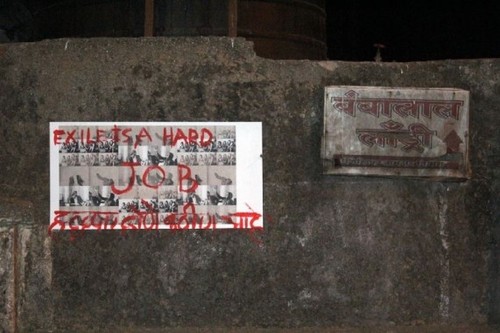© Turkuvaz Haberleşme ve Yayıncılık 2024
As always, Brussels was rainy. This must be my Brussels curse. Whenever I go there, I have never encountered any sun. Perhaps, the entire crisis that the European Union has faced the last few years is fretting its capitol. European countries are facing some deep problems, like the immigration flux and the irrepressible rise of far-right movements all over Europe that use refugees and migrants as fear objects. A contemporary art museum in the capitol of Europe, WIELS, is hosting a huge exhibition called "The Absent Museum," which is trying to make Europe remember its own values, such as "development of an instrument for self-analysis and self-criticism," which is passing into oblivion.
WIELS features 45 international artists who challenge the idea of "The (Absent) Museum in the capitol of Europe." Marcel Broodthaers, Isa Genzken, Marlene Dumas, Wolfgang Tillmans, Otobong Nkanga, Francis Alys, Jean-Luc Moulene and Nil Yalter are some of the artists that occupy four floors of WIELS and two neighboring buildings, Brass and Metropole. It is not just a four-month exhibition, rather it is a platform for spending time and thinking, discussing and debating painful but fundamental issues, which can take place in a serene atmosphere.

A poster inspired by Nazım Hikmet's slogan, "Exile is a hard job."
This was my second encounter with Turkish artist Yalter's work in five months. Last time, I saw her solo show in Arter in Istanbul at the beginning of the year. Yalter was born in 1938 in Cairo of Turkish parents. Yalter has actively produced art for more than 50 years. The Paris-based artist mostly focuses on situations that female and male migrants encounter by adopting "the methods of sociology and ethnology." Yalter's works are on the third floor of the museum where I found the strongest part of the whole exhibition. Yalter presents her poster campaign across Brussels that she did in different cities as well by using the quote "Exile is a hard job" by Turkish poet Nazim Hikmet (1901–1963), who died in exile. Her well-known photographic, graphic and filmic works from her series "Turkish Immigrants" (1977), six new channel video installations from her previous video works and "Immigrants" (2017) are shown.
"Turkish Immigrants" (1977) is a photographic and painting series in frames divided into three sections on three different walls. Yalter divided the frames into lower and upper parts. The lower part of the frames has photographs of immigrants in '70s Europe with a taste of documentary in black and white. In the upper part of the frames, we see her paintings with all faces covered, all of them, every part, are "absent" now. The only thing we see is the background, as Yalter didn't touch the nice '60s wallpaper. It feels as if their identities were absent, having no value. They were people who came as "Gastarbeiter" (guest worker) to provide economic progress for European countries that had lost most of their workforce during World War II. It feels as if Yalter confronts us with the idea that '60s wallpaper had more identity than immigrants. Perhaps, this is a summary of an exhibition trying to discuss the values of Europe.
A new version of Yalter's previous videos on six screens placed in a circle, "Immigrants" (2017) consists of Yalter's following videos: Katran (1975), Bidonville (1976), Meatball (1976), Workers in Paris (1976), L'Isle-d'Abeau (1977) and Workers in Ghent (1978). Each screen has a unique video aesthetic, placed as a circle that represents the archival value of that period. This circle installation helps visitors to engage with the piece easily. Somehow, "Immigrants" (2017) has a sort of "circle" tension that never goes down in politics. Although they look like documentary films, they are between documentary and fiction. For instance, in some videos, Yalter herself is present, helping women in the videos make meatballs. In one video, we barely hear an interview with a Turkish worker in a suit. Interestingly, the interview is in Turkish, and there are no subtitles, a decision that makes the artist's practice more obvious. Yalter is an artist who uses "the methods of sociology and ethnology" as well as documentary to talk about these issues.
The politics of immigration has failed in the European Union. Thus, I care about the intention of WIELS to create a platform for visitors to think, discuss and debate painful but fundamental issues and the intention of remembering the "absent."
